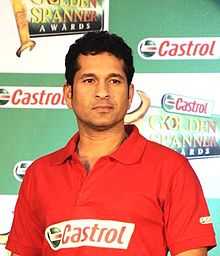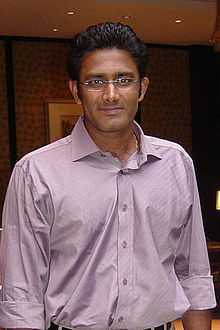1996 Cricket World Cup
| 1996 ICC Cricket World Cup (Wills World Cup) | |
|---|---|
 | |
| Dates | 14 February – 17 March |
| Administrator(s) | International Cricket Council |
| Cricket format | One Day International |
| Tournament format(s) | Round robin and Knockout |
| Host(s) |
Pakistan India Sri Lanka |
| Champions |
|
| Participants | 12 |
| Matches played | 37 |
| Man of the Series |
|
| Most runs |
|
| Most wickets |
|
The 1996 Cricket World Cup, also called the Wills World Cup after its official sponsors, ITC's Wills brand, was the sixth Cricket World Cup, organised by the International Cricket Council (ICC). It was the second World Cup to be hosted by Pakistan and India, and for the first time by Sri Lanka. The tournament was won by Sri Lanka, who defeated Australia in the final at the Gaddafi Stadium in Lahore, Punjab, Pakistan.
Hosts
The Wills World Cup was played in India, Pakistan and Sri Lanka. Controversy dogged the tournament before any games were played; Australia and the West Indies refused to send their teams to Sri Lanka following the Central Bank bombing by the Tamil Tigers in January 1996. Sri Lanka, in addition to offering maximum security to the teams, questioned the validity of citing security concerns when the International Cricket Council had determined it was safe. After extensive negotiations, the ICC ruled that Sri Lanka would be awarded both games on forfeit. As a result of this decision, Sri Lanka automatically qualified for the quarter-finals before playing a game.
Host cities and venues
India hosted 17 matches at 17 different venues, while Pakistan hosted 16 matches at 6 venues and Sri Lanka hosted 4 matches at 3 venues.
India
| Cities | Venues | Capacity | Matches |
|---|---|---|---|
| Kolkata, West Bengal | Eden Gardens | 120,000 | 1 |
| Kanpur, Uttar Pradesh | Green Park | 45,000 | 1 |
| Mohali, Punjab | Punjab Cricket Association Stadium | 40,000 | 1 |
| Bengaluru, Karnataka | M. Chinnaswamy Stadium | 55,000 | 1 |
| Chennai, Tamil Nadu | M. A. Chidambaram Stadium | 50,000 | 1 |
| Hyderabad, Telangana | Lal Bahadur Shastri Stadium | 30,000 | 1 |
| Cuttack, Odisha | Barabati Stadium | 25,000 | 1 |
| Gwalior, Madhya Pradesh | Roop Singh Stadium | 55,000 | 1 |
| Visakhapatnam, Andhra Pradesh | Indira Priyadarshini Stadium | 25,000 | 1 |
| Patna, Bihar | Moin-ul-Haq Stadium | 25,000 | 1 |
| Pune, Maharashtra | Nehru Stadium | 25,000 | 1 |
| Mumbai, Maharashtra | Wankhede Stadium | 45,000 | 1 |
| Ahmedabad, Gujarat | Sardar Patel Stadium | 48,000 | 1 |
| Vadodara, Gujarat | Moti Bagh Stadium | 18,000 | 1 |
| Jaipur, Rajasthan | Sawai Mansingh Stadium | 30,000 | 1 |
| Nagpur, Maharashtra | Vidarbha C.A. Ground | 40,000 | 1 |
| Delhi, New Delhi | Feroz Shah Kotla Ground | 48,000 | 1 |
Pakistan
| Cities | Venues | Capacity | Matches |
|---|---|---|---|
| Peshawar, Khyber Pakhtunkhwa | Arbab Niaz Stadium | 20,000 | 2 |
| Lahore, Punjab | Gaddafi Stadium | 65,250 | 4 |
| Faisalabad, Punjab | Iqbal Stadium | 25,000 | 3 |
| Gujranwala, Punjab | Jinnah Stadium | 20,000 | 1 |
| Karachi, Sindh | National Stadium | 34,228 | 3 |
| Rawalpindi, Punjab | Rawalpindi Cricket Stadium | 25,000 | 3 |
Sri Lanka
| Cities | Venues | Capacity | Matches |
|---|---|---|---|
| Kandy | Asgiriya Stadium | 25,000 | 1 |
| Colombo | R. Premadasa Stadium | 35,000 | 2 |
| Colombo | Sinhalese Sports Club Ground | 10,000 | 1 |
|
Venues in Pakistan |
||
Squads
Teams
All the test playing countries participated in the competition including Zimbabwe who following the last world cup became the 9th Full Test status member of the ICC. The last Three Associate teams to qualify through the 1994 ICC Trophy also made their World Cup debuts in 1996: the United Arab Emirates, the Netherlands and Kenya. The Netherlands lost all of their five matches while the U.A.E. only beat the Dutch. Kenya, however, recorded a surprise victory over the West Indies in Pune.
Overview
The Sri Lankans, coached by Dav Whatmore and captained by Arjuna Ranatunga, used Man of the Series Sanath Jayasuriya[1] and Romesh Kaluwitharana as opening batsmen to take advantage of the fielding restrictions during the first 15 overs of each innings. At a time when 50 or 60 runs in the first 15 overs was considered adequate, Sri Lanka scored 117 runs in those overs against India, 123 against Kenya, 121 against England in the quarter-final and 86 against India in the semi-final. Against Kenya, Sri Lanka made 398 for 5, a new record for the highest team score in a One Day International that stood until April 2006. Gary Kirsten scored 188 not out against United Arab Emirates at Rawalpindi, Pakistan. This became the highest individual score ever in any World Cup match until it was surpassed by first Chris Gayle of the West Indies and later Martin Guptill who scored 215 and 237 respectively in the 2015 Cricket World Cup.
Sri Lanka won the first semi-final over India at Eden Gardens, Kolkata in front of a crowd unofficially estimated at 110 000. Chasing Sri Lanka's innings of 251 for 8, India had slumped to 120 for 8 in the 35th over when sections of crowd began to throw fruit and plastic bottles onto the field. The players left the field for 20 minutes in an attempt to quieten the crowd. When the players returned for play, more bottles were thrown onto the field and fires were lit in the stand. Match referee Clive Lloyd awarded the match to Sri Lanka, the first default ever in a Test or One Day International (as of 2012, there has only been two defaults in a Test or One Day International).
In the second semi-final in Mohali, Australia recovered from 15 for 4 to reach 207 for 8 from their 50 overs. The West Indians had reached 165 for 2 in the 42nd over before losing their last 8 wickets for 37 runs in 50 balls.
Sri Lanka won the toss in the final and sent Australia in to bat despite the team batting first having won all five previous World Cup finals. Mark Taylor top scored with 74 in Australia's total of 241 for 7. Sri Lanka won the match in the 47th over with Aravinda de Silva following his 3 for 42 with an unbeaten 107 to win the Player of the Match award. It was the first time a tournament host or co-host had won the cricket World Cup.
Group stage
Group A
| Team | Pld | Pts | W | L | NR | T | NRR |
|---|---|---|---|---|---|---|---|
| 5 | 10 | 5 | 0 | 0 | 0 | 1.60 | |
| 5 | 6 | 3 | 2 | 0 | 0 | 0.90 | |
| 5 | 6 | 3 | 2 | 0 | 0 | 0.45 | |
| 5 | 4 | 2 | 3 | 0 | 0 | −0.13 | |
| 5 | 2 | 1 | 4 | 0 | 0 | −0.93 | |
| 5 | 2 | 1 | 4 | 0 | 0 | −1.00 |
17 February Scorecard |
| v |
||
| |
|
- Australia forfeited the match due to safety concerns, and were in Bombay at the time of the match.
26 February Scorecard |
| v |
||
- This game was scheduled to be played on 25 February. That game started but was abandoned after 15.5 overs in the Zimbabwe innings.
6 March Scorecard |
| v |
||
| Aravinda De Silva 145 (115) Tito Odumbe 2/34 (5 overs) |
- Sri Lanka's total of 398/5 surpassed England's 363/7 against Pakistan in 1992 as the highest score in all ODIs. The record stood until 12 March 2006, when both Australia and South Africa broke it in the same match. It remained a World Cup record until the 2007 tournament, when India scored 413/5 against Bermuda.[2]
Group B
| Team | Pts | Pld | W | L | NR | T | NRR |
|---|---|---|---|---|---|---|---|
| 10 | 5 | 5 | 0 | 0 | 0 | 2.04 | |
| 8 | 5 | 4 | 1 | 0 | 0 | 0.96 | |
| 6 | 5 | 3 | 2 | 0 | 0 | 0.55 | |
| 4 | 5 | 2 | 3 | 0 | 0 | 0.08 | |
| 2 | 5 | 1 | 4 | 0 | 0 | −1.83 | |
| 0 | 5 | 0 | 5 | 0 | 0 | −1.92 |
27 February Scorecard |
| v |
||
- Match reduced to 47 overs a side due to heavy fog at the start of the match.
29 February Scorecard |
| v |
||
| Aamir Sohail 111 (139) Hansie Cronje 2/20 (5 overs) |
- Bucknor replaced Ian Robinson as an umpire in this match after protests by Pakistan.
Knockout stage
| Quarter-finals | Semi-finals | Final | ||||||||
| 9 March – Faisalabad, Pakistan | ||||||||||
| |
235/8 | |||||||||
| 13 March – Calcutta, India | ||||||||||
| |
236/5 | |||||||||
| |
251/8 | |||||||||
| 9 March – Bangalore, India | ||||||||||
| |
120/8 | |||||||||
| |
287/8 | |||||||||
| 17 March – Lahore, Pakistan | ||||||||||
| |
248/9 | |||||||||
| |
245/3 | |||||||||
| 11 March – Karachi, Pakistan | ||||||||||
| |
241/7 | |||||||||
| |
264/8 | |||||||||
| 14 March – Mohali, India | ||||||||||
| |
245 | |||||||||
| |
202 | |||||||||
| 11 March – Chennai, India | ||||||||||
| |
207/8 | |||||||||
| |
286/9 | |||||||||
| |
289/4 | |||||||||
Quarter-finals
9 March Scorecard |
| v |
||
| Navjot Sidhu 93 (115) Mushtaq Ahmed 2/56 (10 overs) |
- Pakistan was fined 1 over for a slow over rate
Semi-finals
13 March Scorecard |
| v |
||
- The match was awarded to Sri Lanka by match referee Clive Lloyd when play could not be continued due to the rioting crowd.
Final
Sri Lanka won the toss and chose to field. Mark Taylor (74 from 83 balls, 8 fours, 1 six) and Ricky Ponting (45 from 73 balls, 2 fours) shared a second-wicket partnership of 101 runs. When Ponting and Taylor were dismissed, however, Australia fell from 1/137 to 5/170 as the famed 4-pronged spin attack of Sri Lanka took its toll. Despite the slump, Australia struggled on to 241 (7 wickets, 50 overs).
Statistics


|
|
List of centuries
| No. | Name | Score | Balls | 4s | 6s | S/R | Team | Opposition | Venue | Date | ODI #. |
|---|---|---|---|---|---|---|---|---|---|---|---|
| 1. | NJ Astle | 101 | 132 | 8 | 2 | 76.51 | | | Ahmedabad | 14 Feb 1996 | 1048 |
| 2.[3] | G Kirsten | 188* | 159 | 13 | 4 | 118.23 | | | Rawalpindi | 16 Feb 1996 | 1049 |
| 3. | SR Tendulkar | 127* | 138 | 15 | 1 | 92.02 | | | Barabati Stadium, Cuttack | 18 Feb 1996 | 1052 |
| 4. | GA Hick | 104* | 133 | 6 | 2 | 78.19 | | | Peshawar | 22 Feb 1996 | 1057 |
| 5. | ME Waugh | 130 | 128 | 14 | 1 | 101.56 | | | Visakhapatnam | 23 Feb 1996 | 1058 |
| 6. | ME Waugh | 126 | 135 | 8 | 3 | 93.33 | | | Wankhede Stadium, Mumbai | 27 Feb 1996 | 1065 |
| 7. | Aamer Sohail | 111 | 139 | 8 | 0 | 79.85 | | | National Stadium, Karachi | 29 Feb 1996 | 1067 |
| 8. | SR Tendulkar | 137 | 137 | 8 | 5 | 100.00 | | | FSK, Delhi | 2 Mar 1996 | 1070 |
| 9. | RT Ponting | 102 | 112 | 5 | 1 | 91.07 | | | Jaipur | 4 Mar 1996 | 1072 |
| 10. | AC Hudson | 161 | 132 | 13 | 4 | 121.96 | | | Rawalpindi | 5 Mar 1996 | 1073 |
| 11. | PA de Silva | 145 | 115 | 14 | 5 | 126.08 | | | Kandy | 6 Mar 1996 | 1074 |
| 12. | VG Kambli | 106 | 110 | 11 | 0 | 96.36 | | | Green Park, Kanpur | 6 Mar 1996 | 1075 |
| 13. | BC Lara | 111 | 94 | 16 | 0 | 118.08 | | | National Stadium, Karachi | 11 Mar 1996 | 1079 |
| 14. | CZ Harris | 130 | 124 | 13 | 4 | 104.83 | | | Chennai | 11 Mar 1996 | 1080 |
| 15. | ME Waugh | 110 | 112 | 6 | 2 | 98.21 | | | Chennai | 11 Mar 1996 | 1080 |
| 16. | PA de Silva | 107* | 124 | 13 | 0 | 86.29 | | | Gaddafi Stadium, Lahore | 17 Mar 1996 | 1083 |
Trivia
- This was the last ODI World Cup where the West Indies progressed to Semi-final.
Notes and references
- ↑ "Wills World Cup, 1995/96, Final". Cricinfo. Retrieved 29 April 2007.
- ↑ Records / One-Day Internationals / Team records / Highest innings totals – ESPNcricinfo. Retrieved 3 March 2015.
- ↑ This is the highest individual score in World Cup till date
External links
- Cricket World Cup 1996 Scorecards in CricketFundas
- Cricket World Cup 1996 from ESPNCricinfo
- Refresh the Memories of Cricket World cup after 18 years with Lankan Cricket Champions 1996.
| ||||||||||||||||||||||
| ||||||||||


